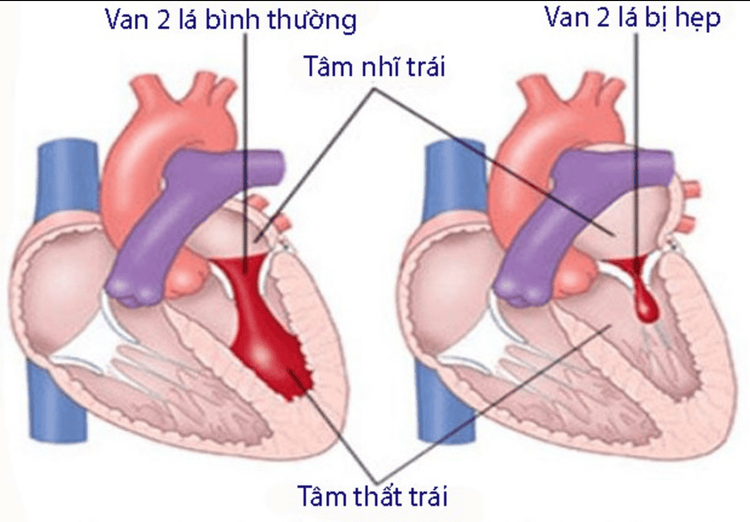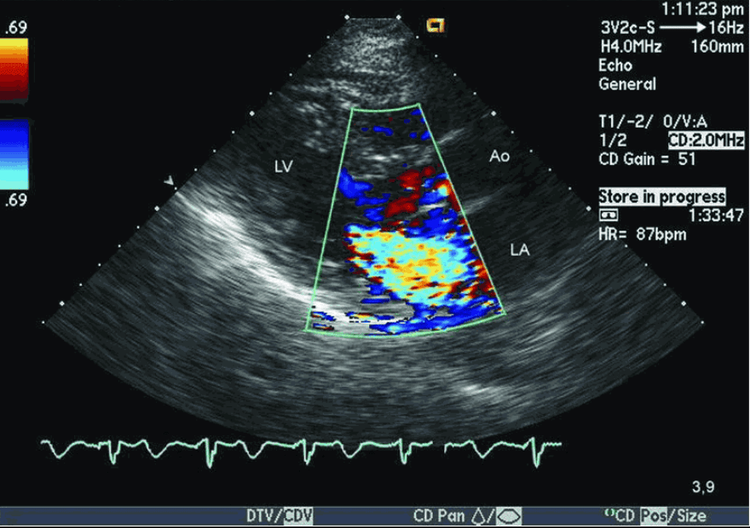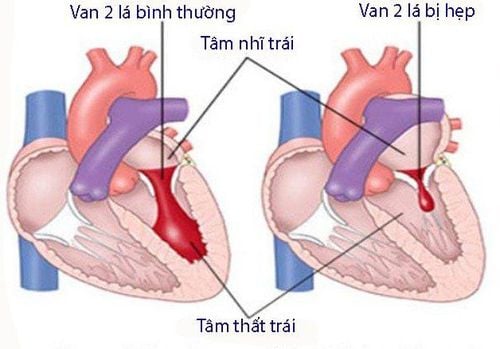This is an automatically translated article.
The article is professionally consulted by Master, Doctor Hoang Thi Hoa - Cardiologist - Department of Medical Examination and Internal Medicine - Vinmec Ha Long International General Hospital.Mitral regurgitation and mitral stenosis are both diseases related to heart valves. However, each disease has its own symptoms and effects on the health of the patient.
1. How do heart valves work?
Heart valves direct the flow of blood according to a one-way principle:
Pumping blood from the upper chambers of the heart to the lower chambers: At this time, the tricuspid and mitral valves open, while the aortic and pulmonary valves close. When blood is pumped from the 2 lower chambers of the heart to the lungs and then to the body: In contrast, the aortic valve and pulmonary valve close while the mitral and tricuspid valves close to prevent blood from flowing back to the heart. . Usually the left side of the heart has a higher pressure than the right side because the blood pressure in the lungs is very low. This means that the left heart valves will have a harder time closing than the right. Blood pressure is usually measured as the blood pressure in the left part of the heart.
The average heart beats more than 100,000 times a day. If the heart rhythm is abnormal, it is possible that one of the two heart valves is not closing tightly or is narrowed. The doctor, when using a stethoscope to listen to the heartbeat in these cases, will hear a heart murmur. Based on the intensity, location, and duration of the murmur, your doctor can tell which heart valve is having a problem.

Cơ chế hoạt động của van tim
2. Mitral regurgitation is different from mitral stenosis?
Heart valves are likened to wings of rhythmically opening and closing with each contraction of the heart, allowing blood to flow to the heart chambers in a certain direction, then blood will be distributed and circulated evenly to the whole body. Therefore, any disease related to the heart valve will affect the function of the heart valve, even causing serious consequences.
Heart valve disease is a condition when one or more heart valves do not work properly to help blood flow in one direction. Mitral regurgitation and mitral stenosis are the most common valvular diseases.
2.1 Mitral stenosis The name of the disease has partly shown the condition of the disease, mitral stenosis is a problem when the mitral valve opening is narrowed, making the opening and closing function of the heart valve affected. This impedes the flow of blood from the valve to the left ventricle. Patients with mitral stenosis may have some symptoms such as fatigue, shortness of breath, and can even lead to more dangerous complications such as heart failure or stroke.
The main cause of mitral stenosis is thought to be rheumatic fever, associated with streptococcus – an infection in children. In many developing countries, rheumatic fever is one of the common diseases and can leave scars on the mitral valve.
Mitral stenosis can be encountered in any subject regardless of age. Patients may be indicated to treat mitral stenosis by endoscopic surgery, open heart surgery or valve replacement. In cases where the disease is not controlled, mitral stenosis can cause serious, life-threatening cardiovascular complications.

Hình ảnh van 2 lá bị hẹp
2.2 Mitral regurgitation Unlike mitral stenosis, mitral regurgitation is a condition when the mitral valve is not closed tightly, allowing blood to flow back when the valve is closed. Mitral regurgitation is also known by other names such as mitral valve abnormalities or mitral valve insufficiency.
When the mitral valve is open, allowing blood to flow back through the heart valve, it affects the functioning of the heart, making the patient feel short of breath and tired. Depending on the severity of the mitral valve disease, the patient will be prescribed different treatment methods. If it is mild, treatment may not be necessary. However, for severe cases of mitral valve prolapse, surgery is needed to repair or replace the heart valve. Without timely intervention, mitral regurgitation can lead to other serious heart-related problems such as heart failure,...
As can be seen, mitral regurgitation and mitral stenosis are 2 pathology is the opposite. Both diseases are not too dangerous at a mild level. However, patients still need to pay attention to timely intervention measures to avoid leading to unwanted serious complications.

Hở van hai lá trên hình ảnh siêu âm tim
To protect heart health in general and detect early signs of myocardial infarction and stroke, customers can sign up for Cardiovascular Screening Package - Basic Cardiovascular Examination of Vinmec International General Hospital . The examination package helps to detect cardiovascular problems at the earliest through tests and modern imaging methods. The package is for all ages, genders and is especially essential for people with risk factors for cardiovascular disease.
Master. Hoang Thi Hoa has more than 10 years of experience in the field of Cardiology, especially in the field of cardiovascular emergency and echocardiography. Doctor Hoa used to be the Deputy Head of Cardiology Department of Quang Ninh General Hospital before working at Vinmec Ha Long International Hospital.
If you notice unusual health problems, you should visit and consult with a specialist.
MORE
Mitral valve disease Treatment of tricuspid valve disease through minimally invasive open heart surgery with laparoscopic support Repair and replace mitral valve through minimally invasive open heart surgery
Please dial HOTLINE for more information or register for an appointment HERE. Download MyVinmec app to make appointments faster and to manage your bookings easily.













